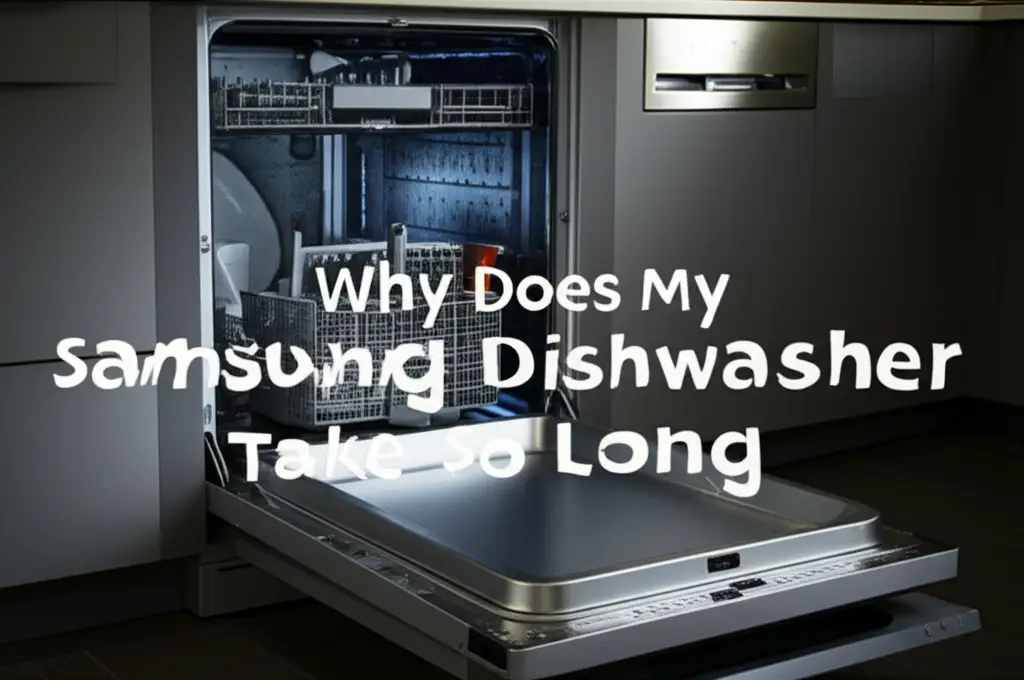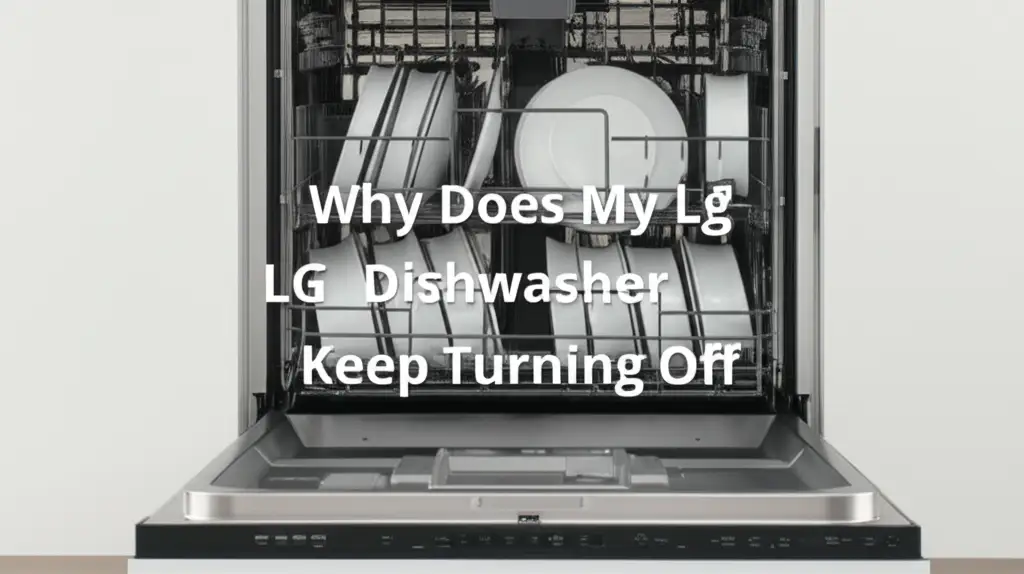· Todd Martin · Home Appliances · 20 min read
Why Does My Lg Dishwasher Take 3 Hours

Why Does Your LG Dishwasher Take 3 Hours?
Do you find your LG dishwasher running for what feels like an eternity? I have been there too. Watching your LG dishwasher take 3 hours to complete a cycle can be frustrating. This lengthy operation often signals an underlying issue. You expect clean dishes, but not at the cost of such a long wait. This guide helps you understand why your LG dishwasher runs for so long. We will explore common causes and simple solutions. By the end, you will know how to get your dishes clean faster.
Takeaway
If your LG dishwasher takes 3 hours, a few common problems cause this. Address water temperature, water pressure, clogs, or sensor issues to fix it.
- Check Hot Water Supply: Ensure your water heater is set correctly and the dishwasher connects to hot water.
- Inspect for Clogs: Clean filters, spray arms, and the drain hose regularly.
- Verify Water Pressure: Low water pressure can extend wash times.
- Reset Electronics: A simple power cycle can often fix minor glitches.
- Understand Cycle Settings: Some cycles are naturally longer for better cleaning.
Your LG dishwasher takes 3 hours because of factors like low water temperature, clogs in filters or spray arms, insufficient water pressure, or issues with internal sensors. These problems make the dishwasher work harder and longer to achieve proper cleaning and drying. Addressing these issues helps restore normal cycle times.
Understanding Normal LG Dishwasher Cycle Times
Many people ask, “Why does my LG dishwasher take 3 hours?” First, we must understand what a normal cycle time looks like for these machines. Modern LG dishwashers often run longer than older models. This is by design. They use less water and energy. This efficiency comes from longer wash phases at lower temperatures. They also have extended drying cycles.
A typical LG dishwasher cycle can range from 1.5 to 2.5 hours. Some specialized cycles, like “Heavy Duty” or “Steam,” might extend beyond this. If your dishwasher consistently runs for three hours or more, it is likely experiencing a problem. This is not normal for most everyday cycles. I learned this firsthand when my new LG seemed to run forever. I initially thought it was broken. It was just more efficient.
Your LG dishwasher uses smart sensors. These sensors detect how dirty your dishes are. The dishwasher then adjusts the cycle length. If dishes are very dirty, the cycle naturally extends. This ensures a thorough clean. If the sensors are faulty, they might misread soil levels. This can cause unnecessary long cycles.
Understanding your specific LG model’s manual is helpful. The manual lists expected cycle times for each setting. Comparing your actual run time to these figures gives a clear picture. If your “Normal” cycle runs for three hours, something is wrong. If your “Heavy Duty” cycle runs that long, it might be expected. This helps you figure out if you have an actual issue.
When my LG dishwasher started running for an extended duration, I first consulted the user manual. It helped me learn about different cycles and their expected run times. This initial check can save you a lot of troubleshooting time. You can determine if the long duration is normal for your chosen cycle or if it indicates a problem that needs attention. Remember, modern appliances are different. They work differently than older ones did.
Water Temperature and Heating Issues
One common reason your LG dishwasher takes 3 hours is water temperature. Dishwashers need hot water to clean effectively. They also need it for drying. If the incoming water is too cold, the dishwasher must heat it. This adds significant time to the wash cycle. Most dishwashers need water around 120 degrees Fahrenheit (49 degrees Celsius).
Check your home’s water heater settings. Is it set to an adequate temperature? If not, adjust it upwards. Also, ensure the dishwasher connects to your hot water supply. Some people mistakenly connect it to the cold water line. This will always result in longer cycles and poor cleaning. I made this mistake once with a new install. The dishes came out cold and dirty. I quickly fixed the connection. Does LG dishwasher connect to hot or cold? This common query shows many people face this confusion.
The dishwasher has an internal heating element. This element heats the water further. It also helps with the drying process. If this element fails, water will not get hot enough. The dishwasher will try to compensate. It runs longer to try and sanitize. It also runs longer to dry dishes without heat. You might notice dishes are still wet after the cycle finishes. This is a clear sign of a heating element issue.
Test the heating element. You can often do this by running a cycle and listening for it. Sometimes, you can feel the heat inside the tub during the dry cycle. If the element is faulty, it will need replacement. This is usually a job for a professional. Do not try to fix it yourself if you are not comfortable with appliance repair. Faulty heating elements significantly increase wash times and reduce cleaning performance.
Another factor is the distance from your water heater. If your dishwasher is far from the water heater, cold water sits in the pipes. The dishwasher pulls this cold water first. It takes time for hot water to reach the unit. To solve this, run your kitchen sink’s hot water for a minute before starting the dishwasher. This purges the cold water from the line. Then, your dishwasher starts with hot water immediately. This small step can shave off precious minutes.
Low Water Pressure and Supply Problems
Insufficient water pressure can also make your LG dishwasher take 3 hours. Dishwashers need a consistent water supply. They use this water for powerful spray. If water pressure is low, the unit struggles to fill properly. It also struggles to spray water with enough force. This extends fill times and wash times.
Check your home’s water pressure. You can buy a water pressure gauge at a hardware store. Attach it to an outdoor spigot. A healthy household water pressure ranges from 40 to 60 PSI. If your pressure is below 20 PSI, this is a problem. It could affect all water-using appliances. If your water pressure is low, contact your utility company. They might need to inspect your main line.
The dishwasher’s fill valve can also be at fault. This valve opens to let water into the tub. If it is clogged or faulty, water fills slowly. The dishwasher timer keeps running during this slow fill. This adds to the overall cycle duration. You might hear a weak trickling sound instead of a strong flow when the dishwasher fills. Why is my LG dishwasher not filling with water? This related issue confirms fill valve problems are common.
Inspect the water supply hose for kinks or blockages. A kinked hose restricts water flow. This reduces pressure to the dishwasher. Straighten any kinks you find. Also, check the screen filter at the end of the supply hose. This filter connects to the dishwasher. Mineral deposits or debris can clog it. Clean this filter regularly to ensure proper water flow. I once found a tiny rock in mine. It caused endless filling problems.
Sometimes, the water inlet valve itself is defective. It may not open fully. It might not let enough water pass through. In this case, the valve needs replacement. This is usually a part of the professional repair. A technician can test the valve’s functionality. They can replace it if it is faulty. Addressing water supply issues makes your dishwasher fill faster. This helps shorten the overall cycle time significantly.
Clogged Filters and Spray Arms
Clogged components are a very common reason your LG dishwasher takes 3 hours. Over time, food particles, grease, and hard water minerals build up. These materials block the dishwasher’s filters and spray arms. When filters are dirty, water cannot drain properly. When spray arms are blocked, water does not reach all dishes effectively. The dishwasher then runs longer to compensate.
Your LG dishwasher has a filter system at the bottom of the tub. This filter traps food debris. It prevents debris from recirculating onto your dishes. If this filter is clogged, water cannot flow freely. The dishwasher struggles to clean. It also struggles to drain. This adds significant time to the wash cycle. I check my filter weekly. I often find small food bits or even a rogue label.
To clean the filter, twist and pull it out. Rinse it under running water. Use a soft brush to scrub away any stuck-on debris. Some LG models have a two-part filter. Make sure to clean both parts. This simple maintenance step takes only a few minutes. It can prevent many long cycle issues. Regular filter cleaning is essential for efficient dishwasher operation.
The spray arms also get clogged. These arms have small holes that spray water onto your dishes. Food particles or mineral deposits can block these holes. When holes are blocked, water pressure weakens. Water does not reach all dishes. The dishwasher runs longer trying to get dishes clean. You might notice some dishes come out dirty.
Remove the spray arms. You can usually unscrew them easily. Use a toothpick or small wire to clear the holes. Rinse the arms thoroughly under water. Make sure all holes are clear before reattaching them. I do this every few months. It helps ensure consistent water spray. Clean spray arms make a big difference in cleaning power and cycle length.
A build-up of soap scum or grease can also occur. This build-up happens in the dishwasher’s interior and hoses. It happens even if you scrape dishes before loading. Use a dishwasher cleaner regularly. These cleaners remove grease and mineral deposits. Run an empty cycle with a specialized cleaner. This keeps the internal components free of build-up. A clean dishwasher simply runs better and faster.
Drain Pump and Hose Obstructions
If your LG dishwasher takes 3 hours, a drain issue might be the cause. After washing, the dishwasher must drain dirty water. If the drain pump or hose is obstructed, water cannot exit quickly. The dishwasher will pause. It will try to drain again. This repeats until water clears. This struggle adds significant time to the cycle. You might notice standing water in the bottom of your dishwasher. Why does my LG dishwasher have water in the bottom? This is a common sign of a drain problem.
First, check the drain hose. This hose connects the dishwasher to your sink drain or garbage disposal. It can get kinked. It can also get clogged. Food debris, grease, or even small objects can block it. Straighten any kinks you see. If the hose connects to a garbage disposal, ensure the knockout plug is removed. If you recently installed a new disposal, this is a common oversight. I once forgot this plug. My dishwasher would not drain at all.
You can disconnect the drain hose from both ends to inspect it. Look for any blockages inside. You might need to use a plumbing snake or long brush to clear it. Be careful not to damage the hose. Replace the hose if it is severely damaged or clogged beyond repair. A clear drain hose is essential for efficient water removal.
The drain pump is another critical component. This pump forces water out of the dishwasher. If the pump is failing or has an object stuck in its impeller, it cannot drain effectively. You might hear strange noises during the drain cycle. These noises include humming or grinding. A failing pump will cause long drain phases. It will cause repeated attempts to drain.
Accessing the drain pump usually requires removing the lower front panel of the dishwasher. This is a more involved repair. If you suspect a drain pump issue, consider calling a professional. They have the tools to diagnose and replace it safely. A well-functioning drain system ensures your dishwasher moves through its cycles without unnecessary delays. Keeping the drain path clear is key to faster wash times.
Sensor Malfunctions and Advanced Features
Modern LG dishwashers use various sensors. These sensors detect water temperature, soil level, and water clarity. They optimize the wash cycle. If these sensors malfunction, your LG dishwasher takes 3 hours or longer. The dishwasher gets incorrect readings. It then compensates by extending the cycle. It tries to ensure dishes are clean.
The soil level sensor is a common culprit. This sensor “sees” how dirty your dishes are. It adjusts water usage and wash time. If the sensor is dirty or faulty, it might always detect “very dirty” dishes. This causes the dishwasher to run a long, heavy-duty cycle every time. Even if dishes are lightly soiled. Clean the sensor if you can find it. It often looks like a small, clear lens at the bottom of the tub.
A faulty water temperature sensor (thermistor) can also cause issues. The dishwasher needs to know the water temperature. It uses this for heating and sanitization. If the thermistor sends incorrect low temperature readings, the heating element stays on longer. It tries to heat water that is already hot. This adds significant time to the cycle. Dishes might also come out very hot, indicating prolonged heating.
Advanced features can also affect cycle length. For example, “Sanitize” cycles use high temperatures for extended periods. This adds time. “Delay Wash” features simply postpone the start time, but do not change the cycle length itself. “Smart Diagnosis” features in LG dishwashers can help. Your phone can sometimes connect to the dishwasher. It can then send trouble codes to LG service. This helps diagnose sensor issues without a technician visit.
Sometimes, a simple electronic glitch causes sensor misreadings. A power cycle can reset the dishwasher’s electronics. Unplug the dishwasher from the wall for five minutes. Then, plug it back in. This often clears minor errors. It can reset the control board. I do this with all my appliances when they act strangely. It is a quick and easy first step. This can often fix an LG dishwasher running for 3 hours when no obvious physical problem exists.
Hard Water and Detergent Use
Hard water is another common reason your LG dishwasher takes 3 hours. Hard water contains high levels of minerals. These minerals include calcium and magnesium. These minerals leave deposits inside your dishwasher. They also leave deposits on your dishes. Mineral build-up can clog spray arms and filters. We discussed this earlier. This build-up makes cleaning less effective. The dishwasher works harder and longer.
Hard water also makes it harder for detergent to work. Detergent binds with minerals instead of cleaning agents. This means you need more detergent to get dishes clean. Or, the dishwasher needs to run longer to compensate for poor cleaning. You might see white film on your dishes or inside the tub. This film is a sign of hard water deposits.
Using the wrong amount or type of detergent also affects cycle time. Too little detergent means dishes do not get clean. The dishwasher might try to extend the cycle. It tries to improve cleaning. Too much detergent creates excessive suds. These suds can interfere with the spray arms. They can also interfere with the wash action. This forces the dishwasher to run extra rinse cycles. These extra rinses add time.
Use high-quality dishwasher detergent. Check the detergent instructions. Use the recommended amount for your water hardness. If you have hard water, consider using a rinse aid. Rinse aid helps water sheet off dishes. It prevents water spots. It also helps with drying. Some LG dishwashers have a dedicated rinse aid dispenser. Keep it filled.
Consider using a dishwasher cleaner designed for hard water. These cleaners contain agents that dissolve mineral build-up. Run them periodically. This keeps the internal components free of scale. A water softener for your entire home is a long-term solution for hard water. It improves cleaning performance for all appliances. It also helps prolong their lifespan. Clean dishwashers simply work better and faster. They handle hard water issues.
Energy Saving Modes and Wash Options
Your LG dishwasher takes 3 hours possibly due to selected wash options. Modern dishwashers come with many cycles and options. Some options are designed to save energy. They do this by using lower temperatures or less water. These cycles often take longer. They compensate for lower heat or less water with extended wash times. For instance, the “Eco” or “Energy Saver” cycle is typically longer.
Check the cycle you are using. Are you choosing a normal cycle or an energy-saving one? Many people select these modes without realizing the time commitment. An “Eco” cycle might run for three hours. It might even run longer. This is a design feature, not a fault. It saves energy by reducing power consumption. It prolongs the wash duration instead.
Other options like “High Temp Wash” or “Sanitize” also add time. They ensure water reaches higher temperatures. They maintain these temperatures for a specific duration. This kills bacteria effectively. If you regularly use these options, expect longer cycles. They are not problems. They are features.
Some LG dishwashers also feature soil-sensing technology. The “Auto” cycle uses this. It detects how dirty your dishes are. It adjusts the cycle length accordingly. If you load very dirty dishes, the “Auto” cycle will extend itself. It might run for three hours. This ensures thorough cleaning. If you load lightly soiled dishes, the “Auto” cycle might finish in less time.
Review the control panel settings before starting a wash. Make sure you select the appropriate cycle for your load. If you want a faster wash, choose a “Quick” or “Express” cycle. These cycles are shorter. They might not clean as thoroughly. They are good for lightly soiled dishes. Understanding your dishwasher’s options helps you avoid surprisingly long wash times. It makes sure you choose the right cycle for your needs.
Regular Maintenance and Best Practices
Regular maintenance is key to preventing your LG dishwasher from taking 3 hours. A little proactive care goes a long way. It ensures your dishwasher runs efficiently. It also prolongs its lifespan. I follow a strict maintenance schedule for my dishwasher. It helps me avoid common issues.
First, always scrape off large food particles from dishes before loading. You do not need to pre-rinse. Just remove solids. This prevents clogs in the filter and drain system. It reduces the amount of debris circulating during the wash. Less debris means less work for the dishwasher.
Clean the dishwasher filter regularly. I recommend cleaning it weekly or bi-weekly. It is easy to do. Simply remove the filter. Rinse it under running water. Use a brush to scrub away stuck-on food. A clean filter ensures proper drainage and water flow.
Check and clean the spray arms often. Make sure all the small holes are clear. Use a toothpick or small wire to clear any blockages. Clean spray arms ensure water reaches all dishes effectively. This leads to better cleaning in less time.
Run a dishwasher cleaning cycle monthly. Use a specialized dishwasher cleaner. These cleaners remove grease, soap scum, and mineral deposits. They keep the internal components spotless. A clean interior prevents build-up that slows down your dishwasher.
Ensure your dishwasher is connected to the hot water supply. Make sure your water heater is set to at least 120 degrees Fahrenheit. Run the hot water at the kitchen sink before starting the dishwasher. This ensures it starts with hot water immediately. This prevents the dishwasher from spending extra time heating cold water.
Proper loading also matters. Do not overcrowd the dishwasher. Overcrowding blocks water spray. It prevents water and detergent from reaching all surfaces. This results in poor cleaning. It forces the dishwasher to work harder. This can extend the cycle. Load dishes properly for optimal cleaning and shorter cycles. By following these simple maintenance tips, you can keep your LG dishwasher running smoothly. You can prevent it from taking 3 hours for a wash.
Frequently Asked Questions
Q1: Is a 3-hour wash cycle normal for an LG dishwasher? A1: A 3-hour wash cycle is typically longer than normal for most standard LG dishwasher cycles. While heavy-duty or sanitize cycles can approach this duration, a standard “Normal” cycle should usually finish in 1.5 to 2.5 hours. If your everyday cycle consistently takes 3 hours, it suggests an underlying problem that needs checking.
Q2: How do I make my LG dishwasher run faster? A2: To make your LG dishwasher run faster, ensure it receives hot water from the start. Clean the filter and spray arms regularly. Check for proper water pressure. Avoid selecting energy-saving or sanitize options for everyday loads. Using the “Quick” or “Express” cycle can also speed things up for lightly soiled dishes.
Q3: Can hard water cause my dishwasher cycle to be longer? A3: Yes, hard water can absolutely cause your dishwasher cycle to be longer. Minerals in hard water lead to build-up on internal components like filters and spray arms. This reduces cleaning efficiency. The dishwasher then runs longer to compensate for the poor cleaning performance caused by these mineral deposits.
Q4: Should I pre-rinse dishes to shorten the cycle? A4: Most modern LG dishwashers do not require pre-rinsing. In fact, excessive pre-rinsing can confuse the soil sensor, potentially leading to a shorter, less effective wash. Simply scrape off large food particles before loading. This helps prevent clogs without making the dishwasher work harder than needed.
Q5: What is the most common reason an LG dishwasher takes too long? A5: The most common reasons an LG dishwasher takes too long often involve water temperature issues, clogged filters or spray arms, or low water pressure. These issues make the dishwasher work harder and longer to achieve adequate cleaning and drying, extending the overall cycle duration beyond its normal range.
Q6: How often should I clean my LG dishwasher’s filter? A6: You should clean your LG dishwasher’s filter at least once a week or every other week. This frequency helps prevent the build-up of food particles and debris. Regular cleaning ensures optimal water flow and drainage, which is crucial for efficient wash cycles and preventing extended run times.
Conclusion
I know the frustration of an LG dishwasher that takes 3 hours to clean dishes. It feels like an appliance that helps you save time is instead taking it away. Fortunately, many causes for an extended wash cycle are fixable. We have covered the common reasons today. These include issues with water temperature, water pressure, and stubborn clogs. We also discussed sensor malfunctions and how your selected wash options can play a role.
Remember to start with simple checks. Make sure your hot water supply is adequate. Regularly clean your dishwasher’s filter and spray arms. These small maintenance steps can make a big difference. They often prevent long wash times. If you have done these checks and your LG dishwasher still takes 3 hours, consider calling a professional technician. They can diagnose more complex issues like a faulty heating element or drain pump.
By understanding these potential problems and applying the solutions, you can restore your LG dishwasher to its efficient self. You will enjoy cleaner dishes in less time. Do not let a long wash cycle disrupt your day. Take action today. Get your LG dishwasher running smoothly and efficiently again. Visit our site for more helpful guides on appliance maintenance and repair.
- LG Dishwasher
- Dishwasher Troubleshooting
- Long Wash Cycle
- Appliance Repair
- Home Maintenance





